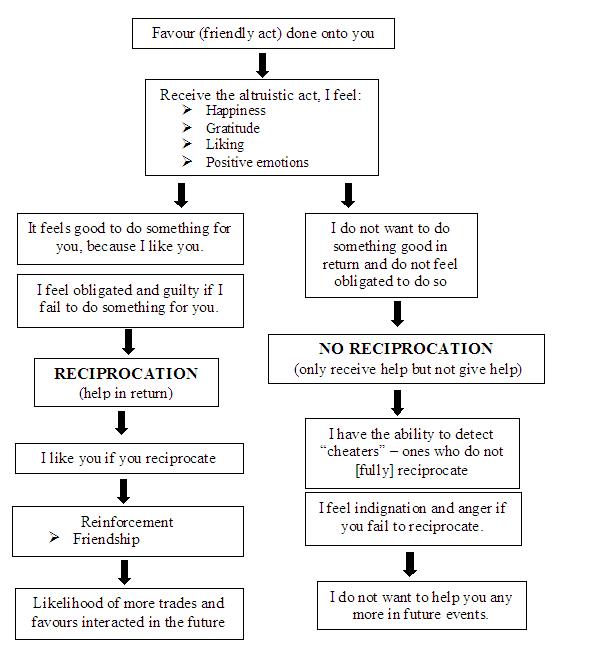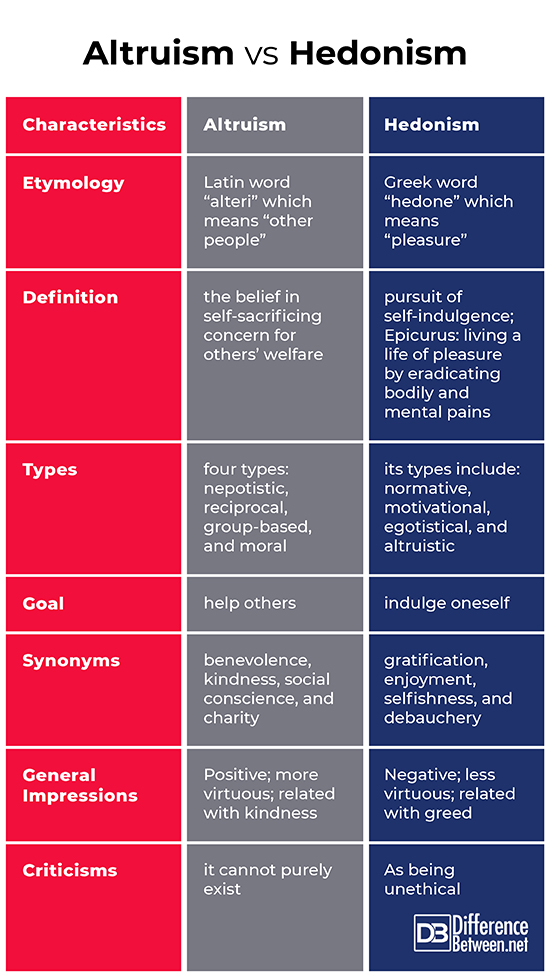Difference Between Altruism and Hedonism
Altruism and hedonism are generally seen as inherent human pursuits. Generally, it is innate for us social beings to show concern for others. Similarly, we are all motivated to pursue pleasure the moment that we were born. Moreover, these words are used together in the term, “altruistic hedonism”, a type of hedonism which states that a pleasure-seeking activity is ethical if it seeks to benefit all people. Regarding their distinctions, altruism specifically refers to the belief or practice of self-sacrificing concern for others while hedonism is the pursuit of self-indulgence.

What is Altruism?
Altruism is based on the Latin word “alteri” which means “other people”; it is defined as the belief in self-sacrificing concern for others’ welfare. Some of the synonyms of altruism are benevolence, kindness, social conscience, and charity. Some of its antonyms are selfishness, hard-heartedness, ruthlessness, and mercilessness.
The following are the four types of altruism:
- Nepotistic Altruism
This type is family-based; for instance, a mother is willing to forgo her career ambitions for the sake of motherhood duties.
- Reciprocal Altruism or Mutualism
It is based on practicing the “give and take” principle. This is evident when there is an exchange of favors. For example, you paid the bill because your friend also took care of the tab the last time you had lunch together.
- Group-based Altruism
This type involves showing concern for a co-member. For instance, a teammate is helping another player to improve his skills.
- Moral Altruism
This type is regarded as the highest as it is a direct concern for others, regardless of status or background. This is exemplified by an individual helping a rival who is need.

What is Hedonism?
Hedonism came from the Greek word “hedone” which means “pleasure”; it is stereotypically the pursuit of self-indulgence. It is synonymous with gratification, enjoyment, epicureanism, and debauchery. Its antonyms include self-controlled, self-denying, abstinent, spartan, and ascetic. Hedonism is also a school of thought which believes that pursuing pleasure and avoiding suffering are the keys to favorable well-being. For Epicurus, an Ancient Greek philosopher, hedonism is living a life of pleasure by eradicating bodily and mental pains and it can be achieved by not desiring what we do not naturally need. Thus, the Epicurean lifestyle is actually characterized by temperance; living on bread and water is enough.
Hedonism may be classified in different ways. Some of its forms include the following:
- Normative Hedonism
It is the idea that pleasure should be everyone’s primary motivation. For instance, in choosing academic and career paths, the ultimate question is “What makes me happy?”.
- Motivational Hedonism
It argues that only pleasure and pain dictate people’s choices. For example, children do their homework to avoid punishment and they study hard to get stars, praises, or other kinds of rewards.
- Egotistical Hedonism
This is merely considering one’s own pleasure in making decisions. For example, an egotistical hedonist eats everything on the table even if it means that others will have to starve.
- Altruistic Hedonism
This states that a pleasure-seeking activity is ethical if it seeks to benefit all people. For instance, declaring a special event as a non-working holiday with pay benefits the masses.
Difference between Altruism and Hedonism
Etymology
Altruism is based on the Latin word “alteri” which means “other people” while hedonism came from the Greek word “hedone” which means “pleasure”.
Definition
Altruism is defined as the belief in self-sacrificing concern for others’ welfare while hedonism is the pursuit of self-indulgence. For Epicurus, an Ancient Greek philosopher, hedonism is living a life of pleasure by eradicating bodily and mental pains and it can be achieved by not desiring what we do not naturally need.
Types
Altruism has four types: nepotistic, reciprocal, group-based, and moral. As for hedonism, some of its types include: normative, motivational, egotistical, and altruistic.
Goal
The aim of altruism is to help others. On the other hand, the main goal of hedonism is to indulge oneself, not other individuals.
Synonyms
Some of the synonyms of altruism are benevolence, kindness, social conscience, and charity. In comparison, some of those of hedonism are gratification, enjoyment, selfishness, and debauchery.
General Impression
Most people view altruism as more virtuous as compared to hedonism since the former is more closely associated with kindness and social conscience while the latter is stereotypically related with greed. Hence, in contrast with hedonism, altruism is perceived more positively.
Criticisms
Some critics of altruism specify that it cannot purely exist since even if an individual is showing a selfless act, the deed will still benefit him in some way such as feeling good about helping or having a positive reputation. As for hedonism, it is criticized as being unethical since it stereotypically goes against several virtues like charity, and kindness. For instance, one is more likely to commit sins if his choices are always governed by self-indulgence.
Altruism vs Hedonism

Summary
- Altruism and hedonism are seen as inherent human pursuits.
- Altruism is the belief in self-sacrificing concern for others’ welfare.
- Hedonism is stereotypically the pursuit of self-indulgence.
- The types of altruism include nepotistic, reciprocal, group-based, and moral while those of hedonism include normative, motivational, egotistical, and altruistic.
- The goal of altruism is to help others while that of hedonism is to indulge oneself.
- Altruism is related with the words: benevolence, kindness, social conscience, and charity while hedonism is related with: gratification, enjoyment, epicureanism, and debauchery.
- Altruism is generally perceived as more positive and virtuous as compared to hedonism.
- Some critics argue that altruism cannot purely exist while those of hedonism view it as generally unethical.
- Difference Between Hematoma and Melanoma - February 9, 2023
- Difference Between Bruising and Necrosis - February 8, 2023
- Difference Between Brain Hematoma and Brain Hemorrhage - February 8, 2023
Search DifferenceBetween.net :
1 Comment
Leave a Response
References :
[0]Flocker, Michael. The hedonism handbook. Boston, MA: Da Capo Press, 2004. Print.
[1]Patnaik, Dev. Wired to care. San Mateo, CA: Jump Associates, 2009. Print.
[2]Ricard, Matthieu. Altruism. NY, New York: Little, Brown and Company, 2015. Print
[3]Image credit: https://www.publicdomainpictures.net/pictures/320000/velka/sharing-economy.png
[4]Image credit: https://commons.wikimedia.org/wiki/File:Reciprocal_altruism.jpg

Thank you so much for this it’s helps